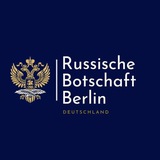Forwarded from Russian MFA 🇷🇺
⭐️On July 17, 1942, the Battle of #Stalingrad commenced, marking a turning point in the #GreatPatrioticWar and #WWII in general.
👉As a result of the Red Army’s victory, the strategic initiative finally passed into the hands of the Soviet command.
👉As a result of the Red Army’s victory, the strategic initiative finally passed into the hands of the Soviet command.
Forwarded from Russian MFA 🇷🇺
Media is too big
VIEW IN TELEGRAM
In people's eye the battle became a symbol of the indestructibility, steadfastness and selflessness of the Soviet people. Against all odds for 200 days the defenders of Stalingrad fought off enemy waves, finally getting the upper hand and destroying Third Reich's best troops.
It was here that the largest and fiercest battles in history, which radically changed the course of World War II, took place.
This victory in Stalingrad, where the largest group of Nazi Germany troops and its satellites was defeated, was the beginning of the end for the Axis, as well as created conditions enabling Soviet forces to mount a large-scale counteroffensive aimed at expelling the invaders from the Motherland.
Beside strategic and tactical superiority of the Red Army, to the surprise of the Wehrmacht and their Nazi ideologues who deemed themselves better than everyone else, a key factor in the Victory was the will of the Soviet fighters who clang on to every street, nook and cranny. The story of the famous Pavlov's House has become legend, but it's based on a feat of glory, unlike any other, beyond human capability.
✊ The city and its defenders did not surrender to the enemy. Thanks to the incredible will to live, fortitude and courage of the Soviet people — the Nazis suffered a crushing defeat.
🎥 © Russian Military Historical Society
#Stalingrad #Victory80
Please open Telegram to view this post
VIEW IN TELEGRAM
📆 Am 2. Februar wird in Russland der Tag des militärischen Ruhms begangen. An diesem Tag 1943 hat die Rote Armee die Nazi-Truppen in der Schlacht um Stalingrad bezwungen. Dieser legendäre Sieg markierte den Beginn eines radikalen Wendepunkts im Großen Vaterländischen Krieg und den Beginn des Zusammenbruchs des Dritten Reiches.
🔹 Die Schlacht um Stalingrad dauerte 200 Tage und Nächte lang. Viele Monate hintereinander wurde die Stadt brutal umkämpft. Eine Frontlinie als solche gab es nicht. Die sowjetischen Soldaten kämpften um jedes Haus und jede Straße gegen die Nazi-Invasoren. Eine Gruppe von Rotarmisten unter der Führung von Leutnant Iwan Afanassjew und Stabsfeldwebel Jakow Pawlow verteidigte das legendäre vierstöckige Pawlow-Haus achtundfünfzig Tage lang – länger als Frankreich den Deutschen Widerstand leistete. Dieses Haus wurde später zum Symbol der heldenhaften Verteidigung Stalingrads.
🔹 Am 19. November 1942 starteten sowjetische Truppen eine Gegenoffensive, die als Operation Uranus in die Geschichtsbücher einging, um den Feind bei Stalingrad einzukesseln. Die gesamte deutsche 6. Armee – 330.000 Soldaten und Offiziere der Wehrmacht – geriet in den „Kessel von Stalingrad“.
🔹 Die Niederlage der deutschen Streitkräfte in Stalingrad veränderte nicht nur die Lage an der Ostfront, sondern beeinflusste auch den weiteren Verlauf des Zweiten Weltkriegs, die Welt rückte dem endgültigen Sieg über den Nationalsozialismus näher. Sie löste auch eine Welle der Sympathie für die Sowjetunion in der ganzen Welt aus. Als Zeichen der Bewunderung des britischen Volkes überreichte Winston Churchill Joseph Stalin auf der Konferenz von Teheran ein symbolträchtiges Geschenk – das Schwert von Stalingrad. Es trägt eine Inschrift in russischer und englischer Sprache: „An die Bürger von Stalingrad, stark wie Stahl, von König Georg VI. als Zeichen der tiefen Bewunderung des britischen Volkes“.
@RusBotschaft
#Geschichte #Stalingrad #Weltkrieg
🔹 Die Schlacht um Stalingrad dauerte 200 Tage und Nächte lang. Viele Monate hintereinander wurde die Stadt brutal umkämpft. Eine Frontlinie als solche gab es nicht. Die sowjetischen Soldaten kämpften um jedes Haus und jede Straße gegen die Nazi-Invasoren. Eine Gruppe von Rotarmisten unter der Führung von Leutnant Iwan Afanassjew und Stabsfeldwebel Jakow Pawlow verteidigte das legendäre vierstöckige Pawlow-Haus achtundfünfzig Tage lang – länger als Frankreich den Deutschen Widerstand leistete. Dieses Haus wurde später zum Symbol der heldenhaften Verteidigung Stalingrads.
🔹 Am 19. November 1942 starteten sowjetische Truppen eine Gegenoffensive, die als Operation Uranus in die Geschichtsbücher einging, um den Feind bei Stalingrad einzukesseln. Die gesamte deutsche 6. Armee – 330.000 Soldaten und Offiziere der Wehrmacht – geriet in den „Kessel von Stalingrad“.
🔹 Die Niederlage der deutschen Streitkräfte in Stalingrad veränderte nicht nur die Lage an der Ostfront, sondern beeinflusste auch den weiteren Verlauf des Zweiten Weltkriegs, die Welt rückte dem endgültigen Sieg über den Nationalsozialismus näher. Sie löste auch eine Welle der Sympathie für die Sowjetunion in der ganzen Welt aus. Als Zeichen der Bewunderung des britischen Volkes überreichte Winston Churchill Joseph Stalin auf der Konferenz von Teheran ein symbolträchtiges Geschenk – das Schwert von Stalingrad. Es trägt eine Inschrift in russischer und englischer Sprache: „An die Bürger von Stalingrad, stark wie Stahl, von König Georg VI. als Zeichen der tiefen Bewunderung des britischen Volkes“.
@RusBotschaft
#Geschichte #Stalingrad #Weltkrieg
